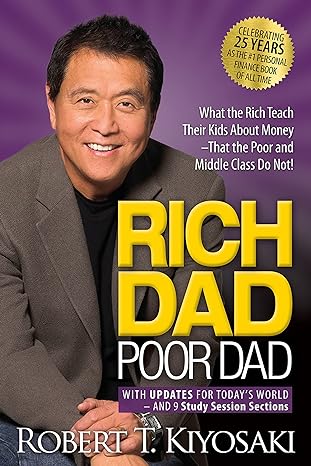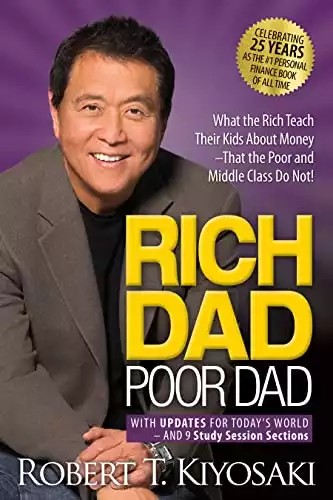Overview : Rich Dad Poor Dad
-
Book Title: Rich Dad Poor Dad
-
Author: Robert T. Kiyosaki
-
Publication Date: April 1997
-
Rating: 4.5
-
price: $6.39
-
Pages: 336
About the Author
Robert T. Kiyosaki is an American entrepreneur, educator, and author which is known for his Rich Dad Poor Dad personal finance book. He born on 8 April 1947, Hawaii, United States of America. Robert Kiyosaki founded his Rich Dad Company which offers personal finance books or videos.
Introduction to Rich Dad Poor Dad by Robert Kiyosaki
In the ever-evolving world of personal finance and investing, few books have made as significant an impact as Robert Kiyosaki's "Rich Dad Poor Dad." Since its publication in 1997, this groundbreaking work has challenged conventional wisdom about money management and wealth creation, inspiring millions to rethink their approach to financial success.
Rich Dad Poor Dad Book Summary - Two Fathers, Two Financial Philosophies
At its core, "Rich Dad Poor Dad" presents a compelling narrative built around Kiyosaki's experiences with two contrasting father figures: his biological father (Poor Dad) and his best friend's father (Rich Dad). Through their divergent approaches to money, Kiyosaki illustrates fundamental lessons about financial literacy and wealth accumulation.
Poor Dad, despite his academic achievements and stable government job, struggles financially due to his traditional beliefs about money and career. Rich Dad, an entrepreneur with less formal education, imparts valuable lessons about financial independence and the power of investing.
"The poor and the middle class work for money. The rich have money work for them." - Robert Kiyosaki
Analysis of Themes: Financial Education and Wealth Building
The Importance of Financial Literacy
Kiyosaki emphasizes the critical role of financial education, arguing that traditional schooling fails to equip individuals with essential money management skills. This theme resonates strongly in today's complex financial landscape, where understanding concepts like compound interest, diversification, and market trends is crucial for making informed investment decisions.
Assets vs. Liabilities: A New Perspective
One of the book's most influential concepts is Kiyosaki's redefinition of assets and liabilities. He posits that true assets generate income, while liabilities drain resources. This simple yet powerful distinction encourages readers to prioritize investments that create cash flow, such as rental properties or dividend-paying stocks, over depreciating purchases like luxury cars.
"Rich people acquire assets. The poor people acquire liabilities that they think are assets.” - Robert Kiyosaki
Entrepreneurship and Investing as Paths to Wealth
Kiyosaki advocates for entrepreneurship and strategic investing as key drivers of wealth creation. He encourages readers to develop multiple income streams and take calculated risks, a philosophy that aligns well with modern trends in side hustles and passive income generation through various investment vehicles, including real estate, stocks, and even cryptocurrencies.
Writing Style: Accessible and Engaging
Kiyosaki's conversational tone and use of personal anecdotes make complex financial concepts accessible to a broad audience. While this approach has been criticized for oversimplification, it undeniably contributes to the book's widespread appeal and readability.
Strengths and Weaknesses of Rich Dad Poor Dad
Strengths:
- Challenges conventional financial wisdom
- Emphasizes the importance of financial education
- Encourages proactive wealth-building strategies
- Accessible to readers with limited financial background
Weaknesses:
- Lacks specific, actionable advice for some financial situations
- Oversimplifies complex financial concepts
- Heavily reliant on anecdotal evidence
- May undervalue the importance of traditional education and employment
Rich Dad Poor Dad Alternatives
While "Rich Dad Poor Dad" shares common ground with other personal finance classics like "Think and Grow Rich" by Napoleon Hill and "The Millionaire Next Door" by Thomas J. Stanley, it distinguishes itself through its narrative approach and focus on mindset shifts. Unlike more data-driven works such as "A Random Walk Down Wall Street" by Burton Malkiel, Kiyosaki's book prioritizes conceptual understanding over specific investment strategies.
Impact on Personal Finance and Investing
The influence of "Rich Dad Poor Dad" extends beyond individual readers to the broader financial education landscape. Its success has contributed to increased awareness of financial literacy's importance, inspiring educational initiatives and sparking discussions about incorporating personal finance into school curricula.
In the realm of investing, Kiyosaki's emphasis on cash flow and passive income aligns with growing interest in dividend investing strategies and real estate investment trusts (REITs). His teachings have also resonated with proponents of alternative investments, including those exploring opportunities in the cryptocurrency market.
Rich Dad Poor Dad Book Review
Rich Dad Poor Dad by Robert Kiyosaki is a transformative guide on wealth-building that contrasts two distinct financial mindsets: one focused on job security, the other on financial independence. Through the lens of his "Rich Dad" and "Poor Dad," Kiyosaki reveals insights into financial literacy, asset creation, and investing. This book challenges traditional beliefs about money, advocating for entrepreneurship, passive income, and calculated risks to build wealth. Simple yet profound, Rich Dad Poor Dad is a must-read for anyone seeking financial freedom, providing practical advice and a new perspective on achieving long-term success and escaping the paycheck-to-paycheck cycle.
Highlights from "Rich Dad" and "Poor Dad"
Wealthy Mindset: The rich prioritize building assets; the poor and middle class focus on income and liabilities.
Financial Literacy: Emphasizes the importance of understanding money management, investing, and financial principles.
Asset Accumulation: Wealth grows by acquiring income-generating assets, not liabilities that drain finances.
Entrepreneurial Thinking: Encourages pursuing business ownership or investing over relying solely on a job.
Embrace Risk: Taking calculated risks and viewing opportunities without fear are key to wealth.
Learn for Growth: Focus on gaining skills and knowledge that will support long-term financial success, not just a paycheck.
Conclusion: A Catalyst for Financial Empowerment
"Rich Dad Poor Dad" remains a powerful catalyst for financial empowerment, challenging readers to take control of their financial futures. While it's not a comprehensive guide to investing or personal finance, its core messages about financial education, entrepreneurship, and strategic wealth-building continue to resonate in today's dynamic economic environment.
For those seeking to expand their financial knowledge and explore new paths to wealth creation, "Rich Dad Poor Dad" serves as an excellent starting point. Its lessons, when combined with additional research and professional advice, can contribute to a more robust and proactive approach to personal finance and investing.
Ready to start your journey towards financial independence? "Rich Dad Poor Dad" today and join millions of readers who have been inspired to transform their financial lives. In conclusion, this article has provided an overview of the topic at hand.





